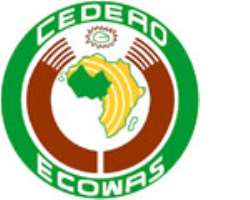MINISTER CANVASSES CAPACITATION OF ECOWAS PARLIAMENT

ABUJA, Nigeria, April 24, 2013/African Press Organization (APO)/ -- Ghana's Attorney General and Minister of Justice, Ms Marietta Brew Appiah-Oppong has urged experts charged with developing a mechanism for enlarging the powers of the ECOWAS Parliament to come up with concrete proposals that will enable the institution influence community legal instruments.
"To make Parliament more effective, it must move from making non-binding decisions to making binding decisions," the Minister said in a speech to the opening of a meeting of regional experts which opened in Accra on Monday, 22nd April 2013.
She also endorsed the proposals in the in the draft Supplementary Protocol being considered during the five-day meeting for the parliament to be involved in approving the budget of the Community and statutory appointees.
The Attorney General and Minister of Justice was represented by the Chief State Attorney, Mr Samuel Nerguaye-Tetteh.
The meeting is being attended by experts from ministries of justice, national focal points responsible for ECOWAS affairs in Member States and members of national parliaments.
In his address, ECOWAS Commission's Vice President, Dr. Toga Gayewea McIntosh flagged two possible challenges based on the 38 years of regional integration experiences.
These are in the areas of enforcement of laws to be made by the parliament considering the difficulty experienced with the ratification and domestication of regional instruments and the role of parliament in realizing the objectives of the regional vision of a citizen-driven community.
"There is no divided opinion that the community parliament is indeed the institution that is well placed to acquaint community citizens with our vision and take home the ECOWAS project in order to gain their full support," affirmed the Vice President who chairs the Commission's internal Committee on the enhancement project.
Describing the meeting as part of continuing efforts at "capacitating our parliament to play its assigned role in our regional integration and development process, " he urged the experts to consider various implications of the proposed enhancement and "come up with realistic and pragmatic recommendations.”
“The task ahead of us is clear and we must join hands and work assiduously to empower the Community Parliament and enable that esteemed and honorable organ take its rightful place in the ECOWAS family of decision making and action oriented institutions," Dr. McIntosh added.
The Speaker of the ECOWAS Parliament, Senator Ike Ekweremadu said the institution inaugurated in 2000, has matured from the periphery of decision making into a "formidable tool for the promotion of the goals of the Community for a prosperous and secure region."
He also explained that the draft Act to be considered by the experts "embodies a series of proposals which I believe will primarily deepen the involvement of the Parliament with its traditional constituency, the Community citizens and permit the parliament to effectively channel their aspirations into Community decisions."
The Speaker said the Parliament does not "seek to appropriate new competences from Member States and shift them to the ECOWAS Community but rather seeks to optimize the existing competence of the Community through the reorganization of mandate among community institutions."
In his goodwill message to the meeting, the Speaker of Ghana's Parliament, Honourable Edward Korbly Doe Adjaho argued that enhanced powers would enable the Parliament to provide leadership for political dialogue to support the implementation of community protocols and regulations.
"An empowered Community parliament will be able to approach age-old challenges from a different perspective and do so with good results," he said in the speech read by the first Deputy Speaker Evo Barton-Odro.
The five day meeting will consider the provisions of the draft Act and make proposals for operationalising them as well as discuss its implications based of the existing power arrangements.
